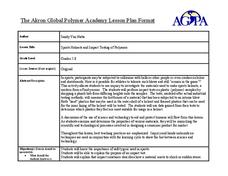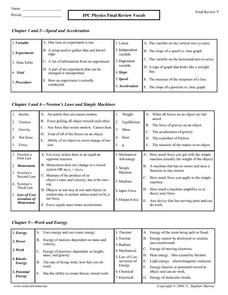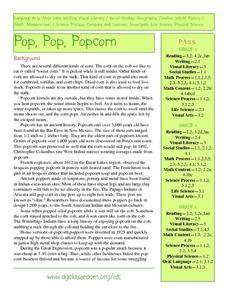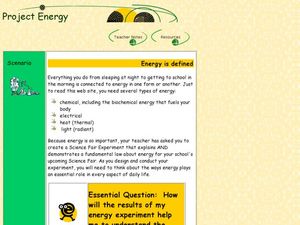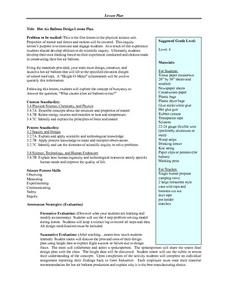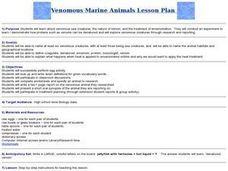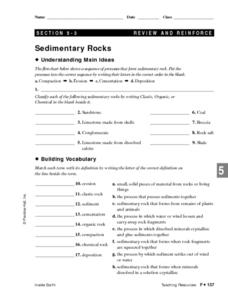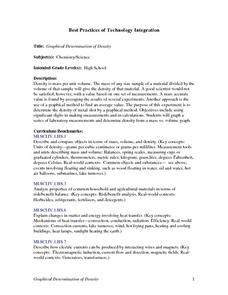Curated OER
Ziplock Chemistry
Students investigate various chemical reactions when creating mixtures in ziplock baggies. In this chemistry lesson, students will recognize various chemical reactions and cite evidence. Safety and assessment strategies are included in...
Curated OER
Sports Helmets and Impact Testing of Polymers
Students examine the importance of good quality safety gear. In this investigative lesson, students will tests various polymers, collect data, and analyze the data to determine which polymer is best for safety helmets. They will design a...
Curated OER
IPC Physics Vocabulary Review
In this physics review instructional activity, students review vocabulary words associated with speed, acceleration, Newton's Laws and simple machines, work and energy, magnetism, electricity, and harmonic motion and light. This...
Curated OER
Planetary Diversity
Students explore the infrared radiation and the part of the spectrum that is not always visible. In this electromagnetic lesson plan students complete a lab activity on the different wavelengths.
Curated OER
Pop Around the World
Students study the origin of popcorn. They locate countries where it is grown on a world map. They color the world map and glue kernels of popcorn onto the countries from which popcorn originated. They write the names of common items...
Curated OER
Project Energy
Students explore multiple types of energy. In this energy instructional activity, students prepare a science fair project through completing a WebQuest. Students investigate radiant, thermal, and biochemical energy.
Curated OER
Hot Air Balloon Design Lesson Plan
Sixth graders discuss what they know and what they want to know about hot air balloon using a KWL chart. They then use a wide array of materials to design a hot air balloon that will lift successfully in cooperative groups referring to...
Curated OER
Can You See the Light?
Students investigate the transmission of light energy. In this light energy instructional activity, students observe bubbles using different colored filters and record their observations. They also look at a light source through various...
Curated OER
Physical Science Review 5th Grade
In this review of physical science worksheet, students use recall to answer multiple choice questions about electricity and chemical changes. Students answer 25 questions.
Curated OER
Exploring Alternative Energy Sources
Young scholars research the amount and kinds of energy that are produced and consumed in the United States, including the limitations of this kind of consumption. They research and create a display to teach classmates about a specific...
Curated OER
Buoyant Boats
Students design and construct a boat out of aluminum foil and a few other simple materials. The boats then be tested by floating them in water, then adding mass until they sink. They explore the various shapes of boat construction.
Curated OER
Chemical Change
Fifth graders watch a demonstration in which a balloon is inflated using the gas created by combining vinegar and baking soda. Then, in groups, they combine various assigned substances and watch and record the results.
Curated OER
Melting, Freezing, and More!: Phase Transitions
Third graders listen to a talk on phase transitions and view three demonstrations. In this phases of matter lesson plan, 3rd graders complete a worksheet as they listen about phase transitions. They move through three demonstrations of...
Alabama Learning Exchange
How Are Rainbows Created?
Students describe how the sun's rays produce colors. They describe how water causes the sun's rays of light to bend, producing a rainbow.
Curated OER
What’s That, I Can’t Hear You?
Students investigate forms of energy as well as light and sound. In this science instructional activity, students participate in hands-on activities that require them to evaluate how sound affects astronauts in flight. A video of this...
Curated OER
What Does Motion Have to do with Sound?
Second graders investigate and explore sound energy. They investigate how the vibrational motion moves through matter in waves. Students describe sounds and vibrations. They observe that vibrational motion creates sounds. Students record...
Curated OER
Venomous Marine Animals
Students name and describe six venomous marine animals. After participating in an activity, they define new vocabulary words. In groups, they complete worksheets to use while researching a specific venomous animal of their choice. ...
Curated OER
Meteorology Madness
Students probe the dynamic weather changes through several hands-0n activities in this seven lessons unit. The hydrologic cycle, clouds, atmosphere, air movement, fronts, and forecasting form the components presented in this unit.
Curated OER
Temperature and Enzymes
Students compare the times it takes the milk in each of two cups to curdle. They are told that an enzyme that is added to the milk, rennin, is involved in the natural curdling process of milk. Students are asked to consider what...
Curated OER
The Blizzard of 1993
Students read and interpret the information from a barograph from a major winter storm. This task assesses students' abilities to interpret and analyze graphs, construct data tables and graphs, generalize, infer, apply knowledge of...
Curated OER
Let the Sunshine in
Students collect and analyze data to study wavelengths of visible light. They cover Styrofoam cups with three different colors of sun filtering products and shine a lamp directly on the cups. They determine the most effective filtering...
Curated OER
Sedimentary Rocks
Second graders receive an introduction to the rock cycle. They dicuss the geologic rock cycle. They create a simulation of a sedementary rock.
Curated OER
Ice Cream Chemical and Physical Changes
Fourth graders identify characteristics of a simple physical and chemical change. They describe objects by the properties of the materials from which they are made and that these properties can be used separate. Students describe the...
Curated OER
Graphical Determination of Density
Students determine the density of metal shot by a graphical method using significant digits in making measurements and calculations. Students graph a seris of laboratory measurements and determine density from a mass verses volume graph.

